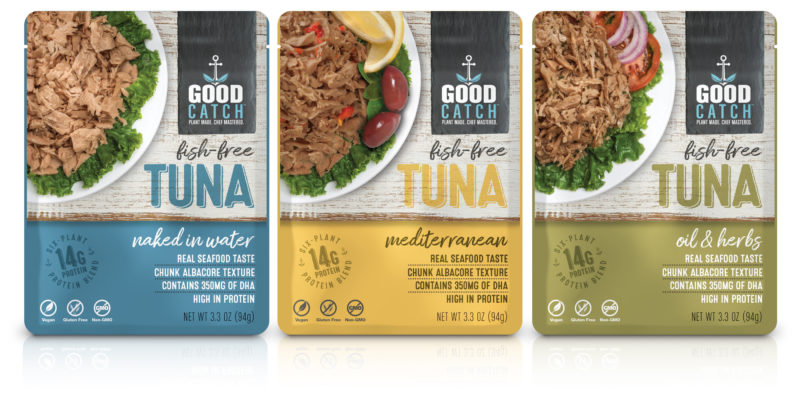Vegan tuna has finally arrived.
Now hitting shelves nationwide at Whole Foods Market and Thrive Market, Good Catch Foods’ vegan tuna is available in three flavors (Naked in Water, Mediterranean, and Oil & Herbs) and provides protein and omega-3 without the suffering behind every serving of fish.
All the flavor and no mercury or plastics? Yes, please. As Good Catch Foods says, it’s “redefining seafood for omnivores and plant based eaters alike.”
And it’s more important than ever to not to think of fish as food, but as living, feeling beings who are also part of a crucial marine ecosystem. The oceans, after all, provide much of the oxygen we breathe.
In addition to the sea being depleted of fish, there is also vast suffering for animals in extreme confinement on fish farms — now the source of half of the world’s fish.
Aquaculture is a rapidly growing form of food production, but that’s not a good thing for animals, the environment or consumers. Aquaculture involves the farming of aquatic animal and plant species.
In 2016, global aquaculture raised roughly 110.2 million metric tons of fish for food. As a grim testament to the magnitude of animals slaughtered in industrial aquaculture, the United States Department of Agriculture measures aquatic animal deaths in tons instead of accounting for the actual number of individual aquatic animals killed in production. One estimate states roughly 47 billion finned fish and shellfish were killed for food in 2013 in the United States alone.
Aquaculture involves the breeding, rearing and slaughter of both freshwater and marine species. Aquaculture confines these animals in a range of environments, from water-based systems with cages and pens in the ocean, to open land-based systems using ponds, rivers, lakes and brackish water, to closed land-based systems where the aquatic animals are kept indoors.
No matter the type of environment, aquaculture is inherently inhumane. Aquatic animals have impressive cognitive abilities, making them aware of the deplorable plights their forced living environments thrusts upon them. Recent scientific developments reveal that many aquatic species have a range of cognitive abilities, including the capacity for pain, pleasure and joy.
Read more about this exciting news for fish and consumers alike. Plus, looking for DIY vegan recipes that are kind to our finned friends? Visit TryVeg.com today to see how to whip up easy “chickpea of the sea” salad, jackfruit croquettes and more.

